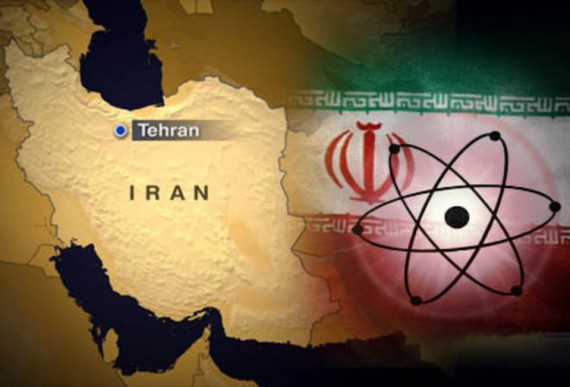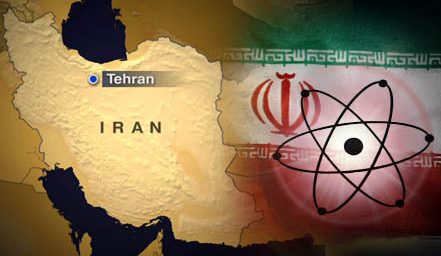On Iran, Diplomacy Beats Containment, And Containment Is Smarter Than Military Action
There are many choices in dealing with Iran's nuclear program there are many choices, but some are better than others.
In a pair of columns, George Will tackles the issues surrounding the deal reaches between the United States, the other “P5+1” powers, and the Islamic Republic of Iran over that nations development of a nuclear program and the international efforts to prevent it from developing nuclear weapons, or the capability of developing nuclear weapons. As I’ve noted since the deal with announced, the deal has come under heavy criticism from many on the right, including some who liken it to the appeasement of Nazi Germany by British Prime Minister Nevile Chamberlain in 1938 that history now regards as a horrible development that served only to encourage Adolf Hitler to further his territorial ambitions. Other conservatives have noted that the deal is only temporary, and that there is a strong likelihood that Iran could easily back out of the deal and resume nuclear development to the point where it would be capable of producing a small number of atomic, as opposed to thermonuclear, weapons in a relatively short period of time. In that case, the West would be left with two alternatives. Either we take some kind of military action in a last ditch effort to fatally damage Iran’s nuclear program, or we find some way to live with a nuclear Iran.
In his first of two columns on the issue, Will cites a Brookings Institution study on the issue which concludes that military action against Iran would carry worse consequences that following a strategy of containment against the Islamic Republic, even if it does have nuclear weapons. Quoting from the study, Will makes this comment:
“As long as Iran is left with the capacity to enrich uranium, the right to perform some enrichment activity, and a stockpile of LEU (low-enriched uranium) . . . then Iran will have a breakout capability. It could be a breakout window as wide as many months, perhaps even a year, but Iran will have the capability to manufacture the fissile material for a nuclear weapon.”
The agreement will not stop Iran from acquiring nuclear weapons; only a highly unlikely Iranian choice can do that. The agreement may, however, prevent a war to prevent Iran from acquiring such weapons. If Pollack is right, and he certainly is persuasive, we have two choices, war or containment. Those who prefer the former have an obligation to clearly say why its consequences would be more predictable and less dire than those in the disastrous war with Iraq.
In his second column on the subject, Will explains quite succinctly why containment is a far better strategy than war:
In “Unthinkable: Iran, the Bomb, and American Strategy,” Pollack argues that Iran’s nuclear program has been, so far, more beneficial to the United States than to Iran. Because of the anxieties and sanctions the program has triggered, Iran is more isolated, weak, impoverished and internally divided than at any time since it became a U.S. adversary in 1979. And one possible — Pollack thinks probable — result of Iran acquiring a nuclear arsenal would be Saudi Arabia doing so. Pollack considers this perhaps “the most compelling reason” for Iran to stop just short of weaponization.
Writing several months before the recent agreement was reached, Pollack said that, given Iran’s adamant refusal to give up all enrichment, it will retain at least a “breakout capability” — the ability to dash to weaponization in a matter of months, even weeks. Hence the need to plan serious, aggressive containment.
Such containment is, as Will notes, hardly historically unprecedented:
The logic of nuclear deterrence has not yet failed in the 64 years since the world acquired its second nuclear power. This logic does not guarantee certainty, but, says Pollack, “the small residual doubt cannot be allowed to be determinative.” His basic point is: “Our choices are awful, but choose we must.” Containment is the least awful response to Iran’s coming nuclear capability.
Not surprisingly, Will’s argument is being heavily criticized by those on the right for whom the idea of a nuclear armed Iran of any kind is completely unacceptable and, indeed, an existential threat not just to Israel but also to the United States itself notwithstanding the fact that Iran currently has no means to deliver a weapon to the Continental U.S., and that Israel has the capability of wiping out Iran’s major population centers in a matter of an hour or less. Jonathan Toobin, for example, repeats the old common arguments that we cannot rely on containment to prevent Iran’s leaders from engaging in what would essentially be a suicidal act:
Iran’s nuclear program is not merely a domestic policy choice that the West regards with distaste (which was the way many in Britain and the U.S. regarded the Nazi treatment of Jews in the 1930s), but a genuine threat to the stability of the regime and the security of the West. After all, the Iranians are not building ICBMs to hit Israel, whose existence would be placed in mortal danger by a bomb in the hands of an anti-Semitic regime pledged to its destruction. Those would be aimed at Europe and the United States. Such a weapon would also provide a nuclear umbrella to Iran’s terrorist auxiliaries in the region and allies such as Syria.
In this respect, Barack Obama’s understanding of the stakes in this question is greater than that of the venerable conservative sage. The president knows that a nuclear Iran would be a catastrophe. He just lacks the will or the smarts to pursue the right policy to prevent it. Will is wrong to write off tough sanctions and diplomacy without their being tried. He’s even more wrong to think the use of force would be worse than a nuclear Iran.
Unlike the Soviet Union, a nuclear Iran could not be neatly contained. Not could the U.S. or Israel be sure it could deter it with nuclear or conventional counter-attacks. But unlike liberals who labor under the delusion that the Iranians could be charmed out of their nukes, Will seems to think the issue doesn’t really matter. In making that case, he seems to be endorsing the mindset of isolationists like Rand Paul or trying to resurrect the foreign policy of Republicans of a bygone era like Robert Taft would have preferred. As such, his appeal for acceptance of Iran’s nuclear ambitions is a distressing indication of the collapse of the consensus on the right about foreign policy that can only give comfort to America’s foes.
On some level, both Toobin and Will make similar mistakes in their argument in the that the write off, prematurely I would submit, the deal that was reached in Geneva last month. As I noted at the time, that deal was meant to be, and in fact is, a temporary arrangement that is clearly designed to both lay the groundwork for a longer term deal that would deal with more complicated issues like Iran’s centrifuges and the enrichment question over more than just a limited period of time, and to provide a mechanism for both sides to test the reliability of the other to abide by the terms of any agreement. There is, of course, no guarantee that it will succeed, but if that would hardly be the disaster that opponents of the deal make it out to be. For the most part, the sanctions that were in place against Iran prior to the deal remain in place. Those that were partly lifted could be reimposed on a moments notice if necessary. Additionally, as we can see from recent rumblings from Congress, there is already talk about additional sanctions being imposed if the current deal does not produce the results intended. Given all of this, the argument that the Geneva deal is somehow fatally flawed to the point where the entire strategy of preventing Iran from developing nuclear weapons has been damaged simply doesn’t stand up to the facts.
Also flawed is Tobin’s assertion that containment would not work because Iran is somehow different from the Cold War era Soviets and Communist Chinese. The only thing that these assertions seem to be based upon are a parsing of statements from the leadership in Iran that suggests that they’d be willing to use nuclear weapons even though it its fairly obvious that such an action would lead, in short order, to the obliteration of their nation. In other words, Tobin and those who agree with him argue, the entire idea of Mutual Assured Destruction, which served to prevent the West and the Communist world from engaging in any kind of direct military confrontation for some five decades is entirely inapplicable because the leadership in Iran would be willing to commit national suicide just for the chance to launch a limited nuclear strike against Israel, Europe, or the United States. It’s worth noting that there were those in the early days of the Cold War who said the same thing about the Communist leadership of our adversaries. Those people, we were told, were so committed to the spread of Communism that they were willing to sacrifice their own people to achieve their goals. History, of course, demonstrates that the truth was quite different. As for containment itself, it’s worth noting that, for the most part, it’s a strategy that succeeded in preventing the Soviet Union from spreading its influence far beyond its sphere of influence in Eastern Europe in a strategically significant way. If it worked for the supposedly bloodthirsty communists, why wouldn’t a similar strategy work for the Iranians?
The containment strategy didn’t come without costs, of course. It meant a massive commitment of U.S. military and other resources (i.e., the Marshall Plan) in Western Europe that began in 1946 and, in some respects, continues to this day. It required military commitments in Asia such as the Korean and Vietnam Wars, although one can raise legitimate questions about just how necessary the American involvement in Vietnam that began in the Eisenhower Administration actually was. And it cause the United States to develop the biggest, most expensive, military arsenal the world has ever known. Arguably, this was all worth the cost given that we managed to bring about the fall of the Soviet empire, and the integration of China into the world’s economic system as a partner rather than an adversary, without ever engaging in direct military conflict with either nation.
A containment strategy against Iran would not require the same kind or level of resources as the Cold War, but it would not be without its costs or potential consequences, not the last being the potential for the proliferation of nuclear weapons to other nations in the Middle East such as Saudi Arabia. The way to avoid that burden, though, isn’t to refuse to negotiate in the hope that the unlikely will happen and Iran will simply surrender, but to engage in actions that we have been over the past half dozen years or so, namely combine sanctions with an effort to push Iran to the bargaining table to reach a deal that allows it to continue its nuclear research and energy development programs while agreeing to the international inspections that would ensure that they don’t take those steps necessary to bring about weaponization. Indeed, one could argue that sanctions are part of the first stages of a containment program. The second stage, hopefully, would be Iran coming to their senses and reaching a diplomatic agreement regarding the development of nuclear weapons. If that fails, however, it seems rather obvious that the West would be far better advised to follow the lessons of the Cold War than to engage in a march toward military confrontation that can only lead to disaster.







Iran/Persia/Parthia has been a fairly rational actor far longer than our country has been in existence. I am more worried about nukes in Pakistan than in Iran. The argument that Iran is dying to acquire nuclear weapons so that they can go down a road that ends with their nation becoming a radioactive sheet of glass is wrong headed, to say the least.
I think the neo-cons are going to be moving shortly from concern with Iran to confronting the “old enemy” China in the Pacific, although since that confrontation doesn’t involve Israel, some of them will still be obsessed with the “threat to Israel.”
The notion that containment can somehow work against a huge nation with thousands of nuclear weapons but not against a middle sized nation with no nuclear weapons is just silly, once you consider it impartially.
@ stonetools
Remember what really matters. Keep
America strongthe defense budget huge…They’ve been able to produce nuclear weapons in a “relatively short period of time” now for at least two decades according to the WingHawks.
Either it’s true and Iran just has decided not to, or once again the WingHawks are dead wrong.
Let’s face it, we can’t have the terrorist do the whole “smoking gun mushroom cloud” scenario again right?
But then we know these guys never pay a price for being wrong. Case in point, some people still seem to care what Toobin and his cohorts think.
I’m not saying I don’t believe it’s not possible they could. I’m just saying that powerful members of the GOP and the nutty media complex that promote them have zero credibility on this issue.
Or on any other for that matter.
@anjin-san:
But Pakistan is our strong ally. We’ve got the cancelled checks to prove it.
Very well-written and well-argued, Doug. At the same time, though, it shouldn’t need to be argued since the conclusion is self-evident.
Are we going to annihilate Iran pre-emptively? No. Therefore they will retain the capacity to develop nuclear weapons. Every country with a physics student among its population has the basic knowledge, and that is indestructible. Iran has the engineers and industrial base to create a bomb if they chose to do so. Period. Attacks short of obliteration can delay, but cannot end the possibility that in 5 or 10 years Iran will recover and redouble its efforts. Which means we’d be buying into decades of attacks on Iran, and on-going war. Are the American people up for that? No.
So the pressure point is on the desire to develop weapons. That’s the crux of it.
Japan could develop nukes tomorrow. They don’t want to. Why? Because they don’t need to. Why? Because they feel protected and not directly threatened. Ditto Germany. Ditto Sweden and Switzerland and South Africa, Australia, Brazil, Argentina, etc…
So, eliminate the external threat to Iran through peace negotiations. Work to bring them into the world community. Reduce their need and you do more to forestall weapons development than you’ll accomplish by military means.
I could probably manage to buy a decent anti-tank weapon. I don’t. Why? Because I don’t see any tanks around here. I live in a civilization that eliminates the need, so all the downsides are on me if I acquire anti-tank weapons: the expense, the legal sanctions, the ostracism, etc…
That’s not to discount the possibility that the Mullahs would like to be Hitler, but since, given the balance of power, they have zero chance of succeeding, the logical path to pursue is diplomacy.
Those in favor of attacking Iran fall into at least 3 camps, although a venn diagram would show a great deal of overlap.
1. Those who take their orders from Israel – American interests be damned.
2. Those who take their orders from the military industrial complex- there is money to be made.
3. Those who just like the idea of America flexing it’s muscles – think John McCain and Lindsey Graham.
They deserve nothing less than to be ignored. The very idea that Iran would attack Israel with nuclear weapons is beyond absurd.
@michael reynolds:
Actually, South Africa has both developed nukes and then dismantled all of them which makes them the only member of a rather unique club.
Bomb , bomb , bomb… Bomb , bomb , Iran
The US has made agreements and treaties with other countries, including Russia. This is no worse and no better, and will work as long as there is verification. The people in Washington need to make sure that they read the agreement before they sign it. None of this “We have to pass it so we can find out what is in it” junk.
“Fine print? They don’t even read the large print”